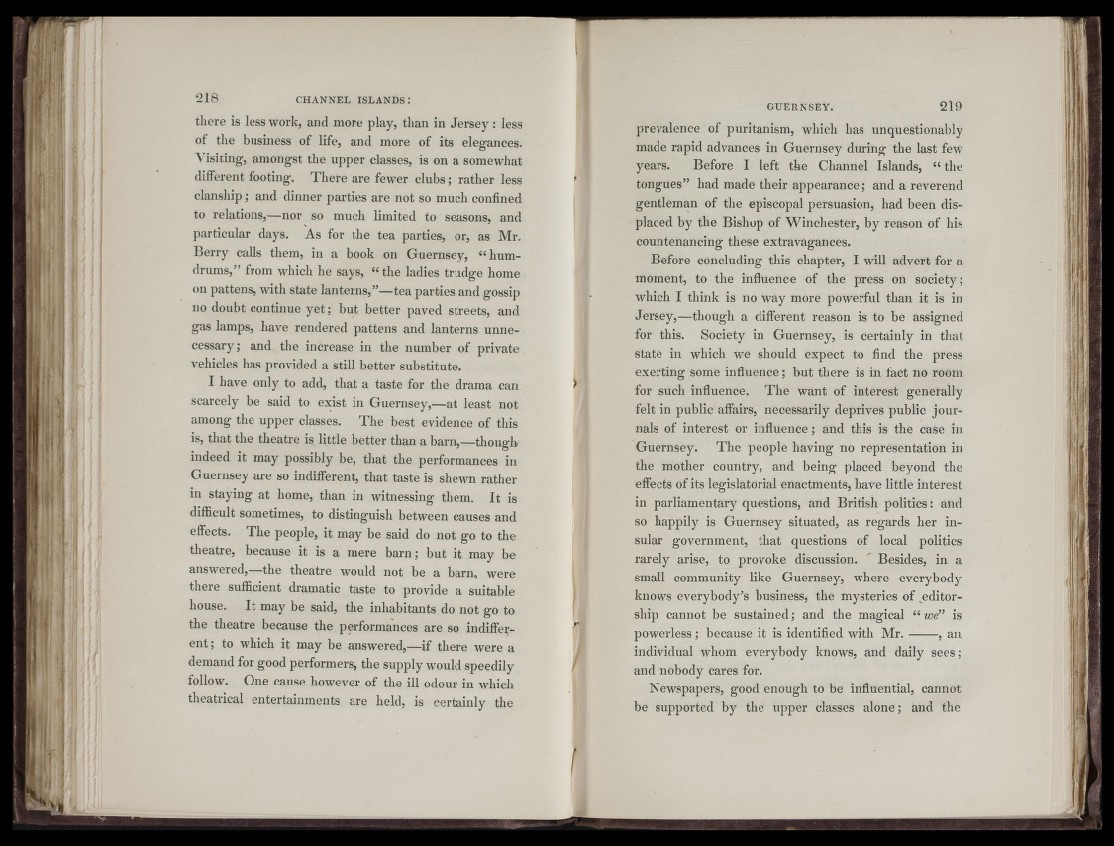
s
I
218 CHANNEL i s l a n d s :
there is less work, and more play, than in Je rse y : less
of the business of life, and more of its elegances.
Visiting, amongst the upper classes, is on a somewhat
different footing. There are fewer clubs; rather less
clanship; and dinner parties are not so much confined
to relations,—nor so much limited to seasons, and
particular days. As for the tea parties, or, as Mr.
Berry calls them, in a book on Guernsey, “ humdrums,”
from whicli he says, “ the ladies trudge home
on pattens, with state lanterns,”—tea parties and gossip
no doubt continue y e t; but better paved streets, and
gas lamps, have rendered pattens and lanterns unnecessary;
and the increase in the number of private
vehicles has provided a still better substitute.
I have only to add, that a taste for the drama can
scarcely be said to exist in Guernsey,—at least not
among the upper classes. The best evidence of this
is, that the theatre is little better than a barn,—though
indeed it may possibly be, that the performances in
Guernsey are so indifferent, that taste is shevm rather
in staying at home, than in witnessing them. It is
difficult sometimes, to distinguish between causes and
effects. The people, it may be said do not go to the
theatre, because it is a mere barn; but it may be
answered,—the theatre would not be a barn, were
there sufficient dramatic taste to provide a suitable
house. It may be said, the inhabitants do not go to
the theatre because the performances are so indifferent
; to which it may be answered,—if there were a
demand for good performers, the supply would speedily
follow. One cause however of the ill odour in which
theatrical entertainments are held, is certainly the
GUERNSEY. 219
prevalence of puritanism, which has unquestionably
made rapid advances in Guernsey during the last few
years. Before I left the Channel Islands, “ the
tongues” had made their appearance; and a reverend
gentleman of the episcopal persuasion, had been displaced
by the Bishop of Winchester, by reason of his
countenancing these extravagances.
Before concluding this chapter, I will advert for a
moment, to the infiuence of the press on society;
which I think is no way more powerful than it is in
Jersey,—though a different reason is to be assigned
for this. Society in Guernsey, is certainly in that
state in which we should expect to find the press
exerting some infiuence; but there is in fact no room
for such infiuence. The want of interest generally
felt in public affairs, necessarily deprives public journals
of interest or infiuence; and this is the case in
Guernsey. The people having no representation in
the mother country, and being placed beyond the
effects of its legislatorial enactments, have little interest
in parliamentary questions, and British politics: and
so happily is Guernsey situated, as regards her insular
government, that questions of local politics
rarely arise, to provoke discussion. Besides, in a
small community like Guernsey, where everybody
knows everybody’s business, the mysteries of editorship
cannot be sustained; and the magical “ we” is
powerless; because it is identified with M r . , an
individual whom everybody knows, and daily sees;
and nobody cares for.
Newspapers, good enough to be infiuential, cannot
be supported by the upper classes alone; and the
i
: a»»ilI!*
Iff